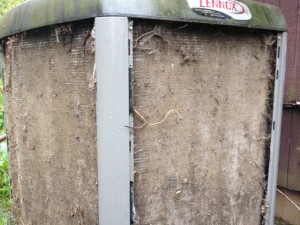4 Things Homeowners Should Do To Get Their Central AC Ready For Summer
As the warmer weather approaches (it’s coming, we promise!) it will be time to use your central air conditioner before you know it. Here are four simple things to check to make  sure your AC unit is ready to do its best this season. A properly prepared and maintained AC unit lasts longer and saves you money.
sure your AC unit is ready to do its best this season. A properly prepared and maintained AC unit lasts longer and saves you money.
1) If it wasn’t covered, check the inside of your AC unit. Look down through the grill to where the motor is and see if any debris is stuck down there or in the screen. With the ELECTRIC OFF to the condenser, take a garden hose and hose off the condenser fins that surround it to get any accumulated dust and debris off. For really dirty coils or fins, consider a professional cleaning and service that uses a specially formulated foaming cleanser to break down and remove the dirt. That is good to do every couple of years.
The disconnect on the condenser: flip the on/off breaker in the small gray box hanging right behind the AC unit on the outside wall to the off position OR grab the wire handle disconnect located in the box and pull it straight out towards you. After you are done hosing off the unit, flip the switch back to on or place the handle back in the box.
2) Check the furnace/air conditioner filter. Lots of people think the furnace filter is only used for heating during the winter but that’s not the case at all. It’s used for both your heat AND your air conditioning and a clogged filter makes the unit work much harder to get clean, cool air to you.
3) The first day it gets to 70 degrees, turn the unit on. Seems simple, but it’s a much better time to find out that your air conditioner has a problem early in the season and before it gets too hot. The last thing you want is to discover an issue on a 90-degree scorcher! Make sure the condensate tube is open (you should be able to see water running through it). The Condensate tube is a little tube about 3/4 of an inch that comes out of the A-coil at the top of the furnace and either goes into a drain or a pump. It’s a good practice to make sure water is running when your air conditioner is running. If it doesn’t come out of that tube it’s going to overflow and spill on top of the furnace where it could short out a circuit board.
4) Simplest of all, hold your hand over air vents throughout the house just to make sure cold air is coming out in all the rooms.
If your air conditioner hasn’t been professionally checked in last 5 years consider having an expert, like the trained staff at Wilbur Henry, come and put gauges on it to make sure the unit is working at 100%. Summers are getting so hot now that having gauges put on the air conditioner is a worthy investment. If the charge is low the air conditioning unit will just run and run and run and there goes your electric bill!
4 Things Homeowners Should Do To Get Their Central AC Ready For Summer Read More »



 possibly save an unnecessary service call for central air repair.
possibly save an unnecessary service call for central air repair.
 your furnace is short-cycling (running only for 4-8 minutes then turning off, possibly with the fan still running) you are facing one of two problems; a dirty air filter or an incorrectly sized furnace. In general, for a 12-1400 square foot home, a 60-80,000 btu furnace would be required but it’s important to have a furnace installation technician that you trust to make sure you have the right specs when buying a new furnace. One of the worst things you can do, especially with newer high-efficiency furnaces, is to have too large of a furnace. High-efficiency furnaces are specifically designed to run longer and the wrong-sized furnace will end up short-cycling and causing you some possibly very expensive problems over the long term.
your furnace is short-cycling (running only for 4-8 minutes then turning off, possibly with the fan still running) you are facing one of two problems; a dirty air filter or an incorrectly sized furnace. In general, for a 12-1400 square foot home, a 60-80,000 btu furnace would be required but it’s important to have a furnace installation technician that you trust to make sure you have the right specs when buying a new furnace. One of the worst things you can do, especially with newer high-efficiency furnaces, is to have too large of a furnace. High-efficiency furnaces are specifically designed to run longer and the wrong-sized furnace will end up short-cycling and causing you some possibly very expensive problems over the long term.
